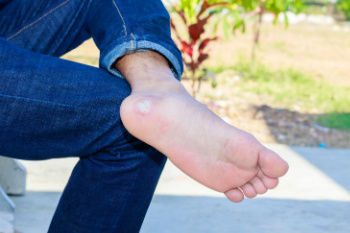 Plantar warts are skin growths, typically found on the soles of the feet, that are caused by the human papillomavirus, or HPV. They most often develop on pressure points, such as the heels or balls of your feet. They may cause discomfort or pain when standing or walking. Plantar warts are characterized by a rough, grainy appearance and may have small black dots at the center, which are actually clotted blood vessels. While some warts can eventually clear up on their own, stubborn plantar warts need medical intervention. A podiatrist, or foot doctor, can treat resistant warts using stronger medications like salicylic acid, cryotherapy, laser treatment, or even minor surgery to remove the wart. These methods not only help eliminate the warts, but also help prevent the spread of the virus to other parts of the foot or to other people. If you have plantar warts, it is suggested you consult a podiatrist for an exam and personalized treatment options.
Plantar warts are skin growths, typically found on the soles of the feet, that are caused by the human papillomavirus, or HPV. They most often develop on pressure points, such as the heels or balls of your feet. They may cause discomfort or pain when standing or walking. Plantar warts are characterized by a rough, grainy appearance and may have small black dots at the center, which are actually clotted blood vessels. While some warts can eventually clear up on their own, stubborn plantar warts need medical intervention. A podiatrist, or foot doctor, can treat resistant warts using stronger medications like salicylic acid, cryotherapy, laser treatment, or even minor surgery to remove the wart. These methods not only help eliminate the warts, but also help prevent the spread of the virus to other parts of the foot or to other people. If you have plantar warts, it is suggested you consult a podiatrist for an exam and personalized treatment options.
Plantar warts can be very uncomfortable. If you need your feet checked, contact Derek Smith, DPM from Oklahoma. Our doctor will assist you with all of your foot and ankle needs.
About Plantar Warts
Plantar warts are the result of HPV, or human papillomavirus, getting into open wounds on the feet. They are mostly found on the heels or balls of the feet.
While plantar warts are generally harmless, those experiencing excessive pain or those suffering from diabetes or a compromised immune system require immediate medical care. Plantar warts are easily diagnosed, usually through scraping off a bit of rough skin or by getting a biopsy.
Symptoms
- Lesions on the bottom of your feet, usually rough and grainy
- Hard or thick callused spots
- Wart seeds, which are small clotted blood vessels that look like little black spots
- Pain, discomfort, or tenderness of your feet when walking or standing
Treatment
- Freezing
- Electric tool removal
- Laser Treatment
- Topical Creams (prescription only)
- Over-the-counter medications
To help prevent developing plantar warts, avoid walking barefoot over abrasive surfaces that can cause cuts or wounds for HPV to get into. Avoiding direct contact with other warts, as well as not picking or rubbing existing warts, can help prevent the further spread of plantar warts. However, if you think you have developed plantar warts, speak to your podiatrist. He or she can diagnose the warts on your feet and recommend the appropriate treatment options.
If you have any questions please feel free to contact our offices located in Ponca City, and Stillwater, OK . We offer the newest diagnostic and treatment technologies for all your foot and ankle needs.
